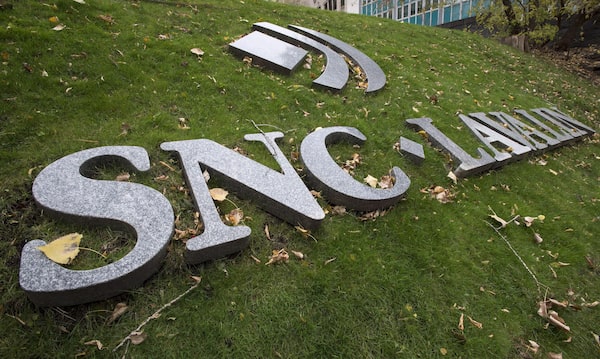
Caisse seems more focused on SNC-Lavalin’s sliding share price than the political consequences of its downsizing.Paul Chiasson/The Canadian Press
Michael Sabia has a problem.
The head of Caisse de dépôt et placement du Québec is facing a massive loss on a huge stake in SNC-Lavalin Group Inc. that the pension fund manager accumulated almost entirely on his watch. But investors’ preferred solution to SNC-Lavalin’s woes – a wholesale retreat from fixed-price contracts – amounts to an abdication that could turn the engineering giant into a mouse.
Just how the exit from fixed-price infrastructure contracts – known in the industry as lump-sum turnkey (LSTK) projects – jibes with the provincial government’s stated goal of protecting one of Quebec Inc.’s leading lights has many business observers in Quebec scratching their heads.
Indeed, many fear the cure could be worse than the disease.
The implications of SNC-Lavalin’s July 22 announcement that it would no longer bid on LSTK projects are just beginning to sink in for politicians and policy-makers in Quebec. The company’s sudden move to withdraw its bid on a $500-million overhaul of Montreal’s Lafontaine tunnel sent the government back to square one only months before work was set to begin. Without a Quebec-based consortium in the running, the province could be in the politically tricky situation of paying a foreign bidder substantially more on the project.
Then there’s the $4.5-billion expansion of Montreal’s Métro, which was cleared last month after Ottawa announced a $1.3-billion contribution to the long-awaited six-kilometre extension. With SNC-Lavalin out of the game, the Coalition Avenir Québec government faces a potential dearth of local bidders and a price-increase that could haunt it at election time.
It’s a similar story across Canada. While SNC-Lavalin says it is committed to fulfilling its backlog of LSTK projects – although it is effectively treating them as a discontinued business by hiving them off into a new division called SNCL Projects – it has pulled out of the bidding on several upcoming deals, including Vancouver’s SkyTrain Broadway extension.
For now, the Caisse seems more preoccupied with the relentless slide in SNC-Lavalin’s share price than the political consequences of the company’s downsizing. The Caisse holds about 35 million shares in SNC-Lavalin, or a 20 per cent stake, up from only five million shares since Mr. Sabia took the reins in 2009.
Mr. Sabia has overseen a doubling of the Caisse’s stake in the Montreal-based company since the end of 2016, when its holding stood at 18.5 million shares. Virtually all the additional stock was bought at more than $50 a share. Mr. Sabia conceded on Monday that the value of the Caisse’s stake plunged by about $700-million in the first half of 2019, falling from $1.6-billion to about $900-million. The stock has slid a further $10 since the end of June, closing at $16.36 a share on Tuesday, chopping another $350-million off the value of the Caisse’s holding.
And instead of collecting $40-million in annual dividends, as it did in 2018, the Caisse’s haul will drop to $2.8-million after SNC-Lavalin last week cut its quarterly payout to 2 cents a share.
In February, amid the controversy over the federal director of public prosecutions’ refusal to spare SNC-Lavalin from a trial on fraud charges, Mr. Sabia declared the Caisse would “be a rock supporting this company.” He insisted SNC-Lavalin had made “pretty remarkable progress” since the fraud charges involving its Libyan operations were laid in 2015.
“We’re investing the savings of eight million Quebeckers in 54,000 [SNC-Lavalin] employees and we’re proud of it,” Mr. Sabia added.
Since last month, the Caisse’s unconditional love has turned into tough love.
After the July 22 announcement, the Caisse called on SNC-Lavalin’s board to take “decisive and timely action” to “reverse the current and unacceptable trend of the business.” In comments to reporters on Monday, however, Mr. Sabia suggested the board had internalized that message, and seemed to support the withdrawal from bidding on LSTK projects.
Lump-sum turnkey projects, in which SNC-Lavalin assumes the risk for cost overruns, account for at least a quarter of its current business. Interim chief executive officer Ian Edwards, appointed after the departure in June of Neil Bruce, told analysts last week that SNC-Lavalin will henceforth “concentrate on what we do best,” such as fee-for-service consulting and its nuclear refurbishment business, largely in Ontario.
After announcing a $2.1-billion loss in the second quarter, Mr. Edwards last week called lump-sum turnkey projects “the root cause of the company’s financial underperformance.” But while SNC-Lavalin is not alone in experiencing difficulties managing costs, other engineering firms have navigated the shift to LSTK more successfully. And experts contend such projects are here to stay.
“Clients in the private and public sectors are becoming far savvier about what projects should actually cost,” a 2017 PricewaterhouseCoopers report noted. “As a result, they can demand LSTK contracts. … Some top-performing [engineering and construction] firms are getting better at working with LSTK contracts, but many others haven’t yet fully adapted.”
Ironically, the Caisse has benefited from the trend toward LSTK contracts, counting on a consortium led by SNC-Lavalin to complete the pension fund manager’s own $6.3-billion Réseau Express Métropolitain (REM) light rapid transit project on budget. The REM is a legacy project for Mr. Sabia, and he is staying on until 2021 to oversee its completion.
All bets are off as to whether SNC-Lavalin’s stock price will have recovered by then.